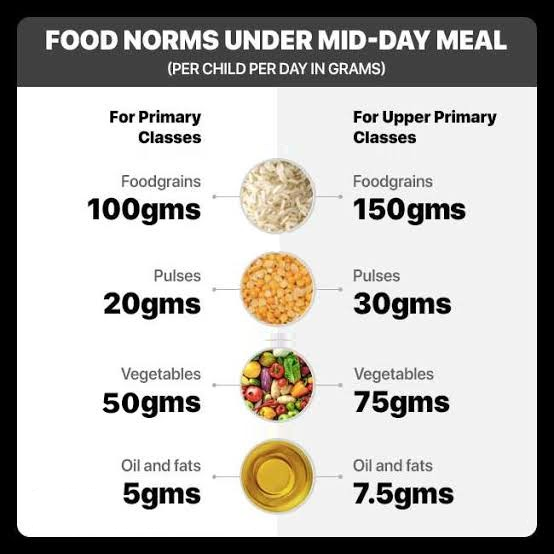Midday Meal Scheme | 14 Apr 2022
For Prelims: Midday Meal Scheme (MDMS,PM Poshan Shakti Nirman or PM Poshan, National Food Security Act (NFSA), 2013.
For Mains: Issues Related to Children, Midday Meal Scheme and Related Issues.
Why in News?
Karnataka is set to provide eggs under the Midday Meal Scheme (MDMS) for school children. MDMS is amongst the largest initiatives in the world to enhance nutrition levels of school-going children through hot cooked meals.
- However, the inclusion of eggs has often been controversial.
What is the Mid Day Meal scheme?
- About: It is the largest school feeding programme of its kind in the world, covering students enrolled in government schools from Classes 1 to 8.
- The basic objective of this scheme is to enhance enrolment in schools.
- Nodal Ministry: Ministry of Education.
- Background: The programme was first introduced in 1925 for disadvantaged children in Madras Municipal Corporation.
- The union government launched as a centrally sponsored scheme on a pilot basis in 1995 for children in Classes 1 to 5.
- By October 2007, MDMS had been scaled up to Class 8.
- Current Status: The current version of the programme, renamed PM Poshan Shakti Nirman or PM Poshan in 2021.
- Scale of Coverage: The scheme covers 11.80 crore children across Classes 1 to 8 (age group 6 to 14).
- Legal Entitlement: It is not just a scheme, but a legal entitlement of all school-going children in primary and upper primary classes, through the National Food Security Act (NFSA), 2013.
- This was also reaffirmed by the Supreme Court’s ruling in People’s Union of Civil Liberties vs Union of India and Others (2001).
- Federal Setup: Under the rules, the allocation of Rs 4.97 per child per day (primary classes) and Rs 7.45 (upper primary) are shared in 60:40 ratio with states and UTs with a legislature, and 90:10 with the Northeastern states, Jammu and Kashmir, Himachal Pradesh and Uttarakhand, while the Centre bears 100% of the costs in UTs without legislature.
What is the Issue Regarding Egg?
- In India, dietary choices are an intensely contested area in India due to caste rigidities, religious conservatism and regional differences.
- As a result, despite successive scientific studies, including those commissioned by state governments, showing the benefits of giving children eggs, many states have been reluctant about adding eggs to the school lunch menu.
What are Associated Issues and Challenges?
- Corrupt Practices: There have been instances of plain chapatis being served with salt, mixing of water in milk, food poisoning etc.
- Caste Bias and Discrimination: Food is central to the caste system, so in many schools, children are made to sit separately according to their caste status.
- Menace of Malnutrition: According to the National Family Health Survey-5, several states across the country have reversed course and recorded worsening levels of child malnutrition.
- India is home to about 30% of the world’s stunted children and nearly 50% of severely wasted children under the age of five.
- Global Nutrition Report-2021: According to the recently released Global Nutrition Report (GNR, 2021), India has made no progress on anaemia and childhood wasting.
- Over half of Indian women in the age group 15-49 years are anaemic.
- Global Hunger Index (GHI) 2021: India has slipped to 101st position in the Global Hunger Index (GHI) 2021 of 116 countries, from its 2020 position of 94th.
Way Forward
- Early Detection & Care: Interventions to improve maternal height and education must be implemented years before those girls and young women become mothers.
- Holistic Perspective of Health: The fight against stunting has often focussed on boosting nutrition for young children, but nutritionists have long argued that maternal health and well-being is the key to reduce stunting in their offspring.
- Improving Menu in MDMS: Expansion and improvement of school meals is needed for inter-generational pay-offs. As girls in India finish school, get married and have children all in just a few years — so school-based interventions can really help.

